Is an employee or worker entitled to a payment in lieu of annual leave upon termination, if they previously took unpaid leave as they were mistakenly treated as a self-employed independent contractor and did not receive any paid annual leave during the working relationship?
No, according to the EAT in the recent case of Smith v Pimlico Plumbers Ltd.
Mr Smith is a plumbing and heating engineer, who worked for Pimlico Plumbers Limited from August 2005 to May 2011. Throughout that period, the Company maintained that Mr Smith was a self-employed independent contractor with no entitlement to paid annual leave. The Claimant did however take periods of unpaid annual leave.
In August 2011, Mr Smith initiated a Tribunal claim for, amongst other things, holiday pay in relation to his 6 years of employment totalling some £74,274.66. Following a number of appeals, the Supreme Court ruled that Mr Smith’s status was that of a worker and not a self-employed independent contractor and consequently he was entitled to paid annual leave.
When the case returned to the Tribunal for determination, the Tribunal accepted that Mr Smith hadn’t received his holiday pay during his employment in breach of the Working Time Regulations and that this amounted to an unlawful deduction from wages but that the claim had been lodged out of time. Mr Smith’s last documented annual leave ended on 4 January 2011, he was allegedly dismissed on 3 May 2011 and his claim wasn’t lodged with the Tribunal until 1 August 2011. Applying the Bear Scotland case, the Tribunal further ruled that a gap of more than 3 months between alleged deductions i.e. between annual leave periods would break a ‘series’ of deductions and in those circumstances, Tribunal claims would need to have been lodged within 3 months of the previous annual leave periods.
Mr Smith sought to rely on an earlier European Court of Justice case of King v Sash Window Workshop (C-214/16) [2018] ICR 693 which ruled that an employee was entitled to carry-over 4 weeks leave (entitlement under the Working Time Directive) from previous years and receive, upon termination of employment, a payment in lieu of annual leave which was not taken in circumstances where the employer had refused or failed to pay for such leave as the person had been wrongly classified as self-employed. The Tribunal ruled that the principles established in the King case did not apply in this case as Mr Smith had taken the annual leave on an unpaid basis, which was materially different to the circumstances in King which related to untaken annual leave. In a Judgment handed down last month, the Employment Appeal Tribunal agreed with the Tribunal’s decision in this regard.
Subject to any appeal, this decision is a significant development for organisations who may be facing significant holiday back pay claims stretching back several years from workers incorrectly labelled as self-employed independent contractors and are subsequently determined by a Tribunal to be employees or workers.
For employers in Northern Ireland however, uncertainty remains pending the outcome of an appeal to the Supreme Court in relation to the PSNI v Agnew & Others holiday pay case in which the Northern Ireland Court of Appeal confirmed that a ‘series’ of deductions was not broken by a gap of more than 3 months between deductions (i.e. between annual leave periods) and consequently an employee would potentially be able to claim holiday pay back to the introduction of the Working Time Regulation in 1998, if their holiday pay had been consistently calculated incorrectly throughout that period.
Louise McAloon is a Partner and the Head of the Employment Department in Worthingtons Solicitors, Belfast and can be contacted by on [email protected] or 028 9043 4015.


